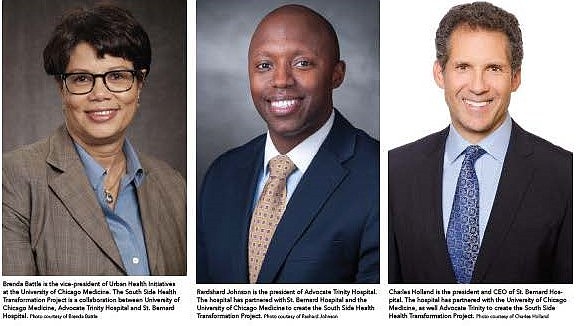HOSPITAL LEADERS JOIN FORCES TO TACKLE HEALTH DISPARITIES
Leaders at Advocate Trinity Hospital, St. Bernard Hospital and the
University of Chicago Medicine have partnered with community residents to create the South Side Health Transformation Project with the hope that it will address some of the health disparities prevalent in the Black community.
Charles Holland, president and CEO of St. Bernard Hospital, said
his hospital wanted to join in on the project in order to address health
disparities, access to healthcare, care coordination and out migration
issues. “I really think that collective action was necessary to address the systemic and ongoing issues,” he said.
Brenda Battle is the vice-president of the Urban Health Initiative at the University of Chicago Medicine. Battle said all three entities bring
different assets to the South side of Chicago. So, it is important for those entities to operate in a connected manner in order to deliver health care to the residents collaboratively.
“It is imperative that we no longer operate as independent institutions trying to solve for all the issues on the South side, but it is important that we operate as a collective, a delivery system that is enabling the health of South side residents,” she said.
Rashard Johnson is the president of Advocate Trinity and South Suburban hospitals. He said when looking at what COVID-19 has done to South side and Black communities, it has spotlighted health inequities that exist and put the issue on a different platform. Johnson said it would take all the entities to leverage all of their assets to improve the quality of healthcare on the South side.
Holland said the vision for the new model for a healthy community
has four major components: an expanded and enhanced primary care
base; an integrated community-based specialty program; an integrated care and coordination platform and a new technology platform that connects the institutions with their patients.
Battle said what makes it new and different is that the model is what the community said was needed to create a better healthcare delivery system for members of the community.
“In our town halls and listening sessions, with community members they stressed the importance of including in a transformation healthcare delivery system on the South Side [using] those four components,” she said. “They also stressed things like having physicians and providers that reflect the community, as well,
that understand the community better.
So, what we think we have built into this model is exactly what the
broader community has expressed is needed to be a better healthcare
delivery system for members of our community.”
Johnson, Battle and Holland agreed that the project is necessary
to address the health inequities that exist on the South Side of Chicago.
They also agree that it’s important for healthcare institutions to get
involved in creating and maintaining health equity.
“These folks will help this system to engage members of the community, and not just making sure they can get access to clinical care services at the respective sites, but they can navigate to the resources that are necessary to help them in addressing the social determinants of health,” Battle said. “So this body, this team
of folks will be boots to the ground, helping individuals get what they
need in terms of the care and services and resources to support their
overall health and well-being.”
Latest Stories
- Cook County Commissioner Donna Miller Launches Congressional Campaign
- Say “Om” with Friends of the Forest Preserves
- Don’t Forget the Least In Our Midst
- Community’s Voice Shapes Future Leadership
- Chicago Board of Education Approves Resolution Launching Healthy Green Schools Pilot Program
Latest Podcast
STARR Community Services International, Inc.

